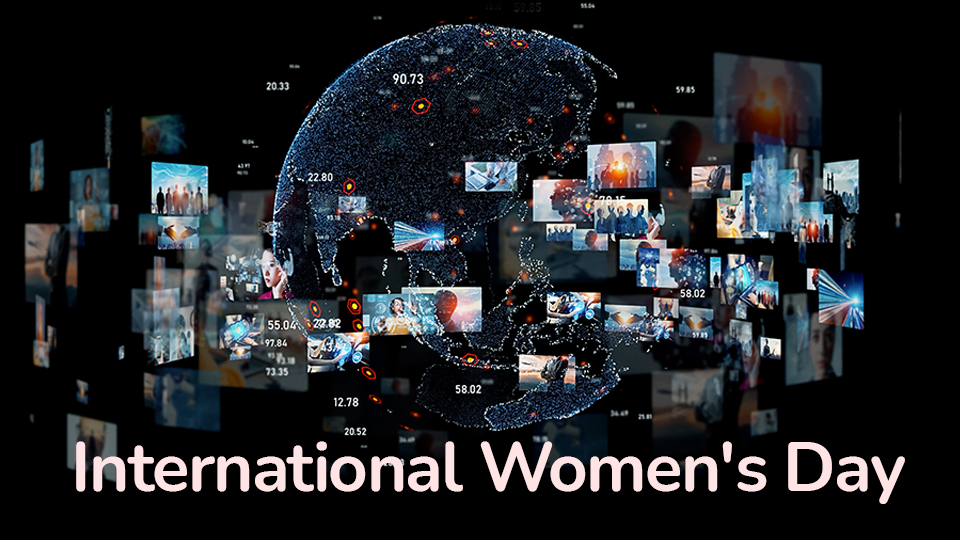Every year in the run up to International Women’s Day on 8th March, part of the conversation on social media invariably turns to whether or not International Women’s Day (IWD) should be celebrated at all. It’s a remarkable and rare alignment between certain left- and right-wing voices, all arguing against celebrating IWD. Perhaps this explains the negative response I witnessed during my recent online live zoom “Women in Media” session, as part of The Economist Foundation’s Topical Talk Festival. When the audience of a thousand or so 10–16-year-old students from Europe, Africa and Asia were asked the question, “Is celebrating IWD an effective way to create change?”, a whopping 7 in 10 disagreed.
Since children are a window on the current global zeitgeist, perhaps this vote indicates the emergence of a prevalent global belief that IWD is either celebrating the wrong thing, is unfair to men or to women or is simply ineffective. This may well be the case, but I am here to illustrate evidentially that if IWD didn’t exist, we would hardly ever hear about women’s gender-related issues in the news. And if women’s perspectives are missing from the news, they are most certainly missing from the radar of those in power, be they political or business leaders. IWD is by no means perfect, but it is the only existing megaphone we have at our disposal to amplify the multiple impediments women face, as well as their achievements and the work left for society to do to close the gender gaps between men and women globally.
Some right-wing groups and religious communities often argue that IWD celebrates the wrong values: instead of celebrating what has traditionally made women unique, such as their mothering and caregiving nature, it celebrates what makes them more like men. Others (often men) feel upset on men’s behalf, finding it unfair that international men’s day (IMD) is not celebrated nearly as buoyantly as IWD. Many don’t even know that IMD exists. Are women better than men after all? No, they are not, they say, so why celebrate them?
Some left-leaning groups and feminists believe that celebrating women one day a year is offensive, as it does not give women’s fight for equality the heft it deserves. Women deserve to be honoured every day, they say, not be paid lip-service once a year (often by self-serving corporate brands), while being violated, discriminated against and/or harassed the rest of the time. Certainly some of the students in The Economist Foundation’s live lesson deemed one day utterly ineffective, suggesting that the celebration should be extended to a month. Others argued that the day should be dropped altogether because it puts women, who are on the periphery of power, under the spotlight to resolve their own discrimination problems, which feels unfair.
Wouldn’t it indeed be remarkable if women were championed and honoured every day of the year as men are? It really would. Personally, there are few things I want more than the equitable treatment of women and gender parity across power structures. Regrettably however, we live in a world where women’s perspectives (and achievements) are honoured a minority of the time in the news (1 in 4 online news contributors being women), in films (1 in 3 speaking roles go to women), in music (1 in 3 Grammy winners this year were women), in AI (1 in 7 AI engineers are women) and in business (1 in 10 of Fortune 500 companies’ CEOs are women).
Women remain on the sidelines of society to such a great extent that over the course of 2023, according to AKAS analysis of GDELT, only half a percent of the online news articles globally referenced gender-related terms 1 that are directly relevant to women. However, on 8 th March last year, the proportion of gender-related articles of relevance to women increased sevenfold. While still marginal, the news coverage of gender-related issues rose to 3% of all articles that day. This meant that on IWD, 1 in 33 articles mentioned important gender-related topics instead of 1 in 222 throughout the year.
If you are presented with a choice of learning about the unique challenges that women face in society and their achievements once a year vs. rarely hearing anything about women’s uniquely underprivileged position in society and how their lives can be made better, which option would you choose? For me there is one option only. #I #choose #IWD.
We have to operate within the world we live in and in this instance, this means paying close attention to what is said/showcased on International Women’s Day. Although a speck in time, each International Women’s Day creates a miniscule dent in the ignorance about inequality in the news, making it a catalyst for change. The question I think we should be asking ourselves therefore is not whether we should be celebrating International Women’s Day but how to create more moments of heightened awareness like it.






